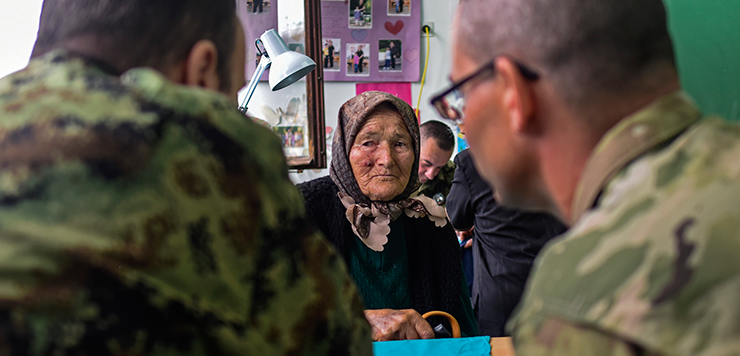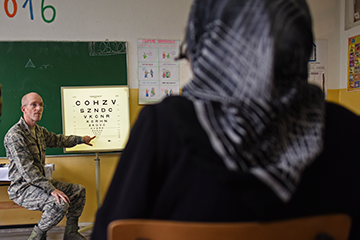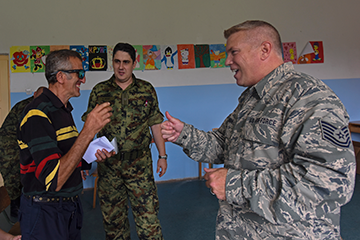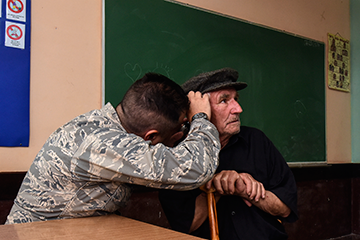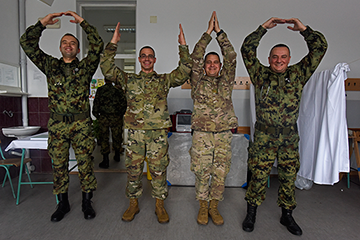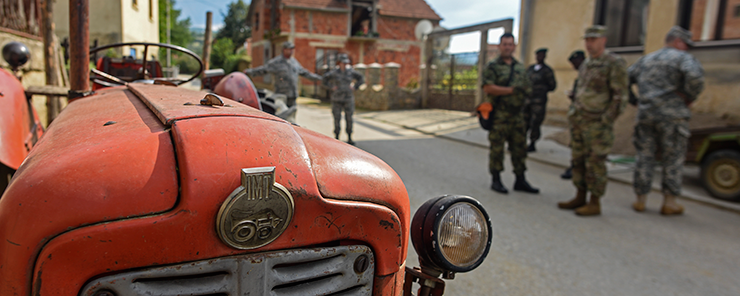COLUMBUS, Ohio (09/21/2016) — Ohio National Guard medical personnel worked with members of the Serbian Armed Forces in a Combined Medical Engagement Sept. 4-17 in various locations throughout southeast Serbia.
The engagement had multiple purposes: to provide humanitarian assistance to Serbian civilians living in rural, medically underserved regions; build a working relationship between the Serbian Armed Forces’ and Ohio National Guard’s medical personnel; and lay the groundwork for a future relationship with the Angolan military.
Personnel, consisting of 31 Serbian Armed Forces members, 25 Ohio Guard members and three observers from the Angolan military, set up clinics at local schools in eight villages in southeast Serbia to bring much needed health care and health care education to the residents in each area. More than 3,000 examinations were performed on about 1,900 patients in the areas of triage, internal medicine, pediatrics, dentistry, orthopedics, gynecology, ophthalmology, otolaryngology and a preventative medicine.
The engagement was part of the National Guard State Partnership Program, which couples state National Guard units with a partner country in order to help improve bilateral relations with the United States. The Ohio National Guard has partnered with the Republic of Serbia since 2006, and has maintained a partnership with Serbia’s neighbor Hungary since 1993.
“About every state has a partnership with another country,” said Maj. Brad Kennedy, operations officer with the Ohio Army National Guard Medical Detachment. “Ohio is lucky enough to have a partnership with Serbia and we just recently celebrated the 10-year anniversary of that partnership.”
One of the main objectives for conducting the event in Serbia this year was to get boots on ground in Angola, ultimately, Kennedy said.
“AFRICOM (U.S. Africa Command) is working on developing operations in the African states and when they understood that Ohio had a partnership with Serbia, and Serbia had a partnership with Angola, they asked us to capitalize on that relationship,” Kennedy said. “We asked the Serbians to spearhead an exercise to build the relationship between Angola and the Ohio Guard, centered on humanitarian assistance for the civilian population.”
“The exercise has been excellent—people have been very willing to come get examinations,” said Maj. Igor Djukic, of the Serbian Armed Forces’ Medical Services Training Center. “Our purpose was to help the people and I think they recognize that.”
Master Sgt. Donald Diller, public health NCOIC with the 178th Wing Medical Group, served on the preventative medicine mobile team. The team was responsible for visiting sites within each village, such as the post office, infirmary, various community buildings and the homes of residents, and address or report issues they encountered. Issues reported included pest infestations and sewer or water supply issues.
Diller recalled a visit to an elderly resident’s home in the village of Reljan.
“The first home we visited belonged to an elderly woman whose sister had recently died and had no other family to look after her,” Diller said. “She just started talking and our guide said she probably had no one to talk to. So even just being involved and offering that human element and human interaction is probably beneficial.”
Many village residents who came to the event to be examined were being seen by medical personnel for the first time in their lives. Tech. Sgt. William McConaha, an ophthalmology technician with the 121st Air Refueling Wing, said about half of the people seen by the ophthalmologist were doing so for the first time.
Working with the Serbian military also served to fortify the working and personal relationships between members to benefit future operations. A similar event is being planned for next year in Angola.
“I think this will be an advantage for future engagements,” said Col. Christopher Coulson, a physician with the OHARNG Medical Detachment. “If we go to Angola together, it will definitely be an advantage that we’ve already formed this relationship and have been working together.”
